

Yanis Varoufakis, "The Econobubble Revisited" The Econobubble Revisitedby Yanis Varoufakis In a recent article, I discussed the 2010 Economics Nobel Prize in rather unflattering terms.
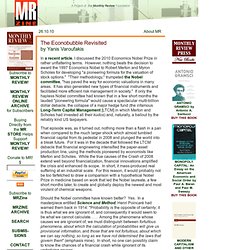
However, nothing beats the decision to award the 1997 Economics Nobel to Robert Merton and Myron Scholes for developing "a pioneering formula for the valuation of stock options. " "Their methodology," trumpeted the Nobel committee, "has paved the way for economic valuations in many areas. It has also generated new types of financial instruments and facilitated more efficient risk management in society. " If only the hapless Nobel committee had known that in a few short months the lauded "pioneering formula" would cause a spectacular multi-billion dollar debacle, the collapse of a major hedge fund (the infamous Long-Term Capital Management [LTCM] in which Merton and Scholes had invested all their kudos) and, naturally, a bailout by the reliably kind US taxpayers.
Philip Pllkington: Purging Economics of Religion – A Rebuttal to Robert Nelson’s Defence of The Great Chain of Being. By Philip Pilkington, a writer and research assistant at Kingston University in London.
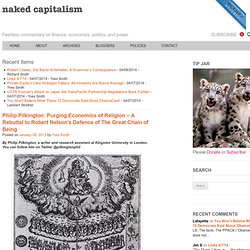
You can follow him on Twitter @pilkingtonphil Recently I stumbled upon what appeared to be an interesting book entitled “Economics as Religion: From Samuelson to Chicago and Beyond” by Robert Nelson, an economics professor at the University of Maryland. This is a vital and interesting topic. I asked a few heterodox economists if they had heard of it. Against Friedman: Why Assumptions Matter. I have previously discussed Milton Friedman’s infamous 1953 essay, ‘The Methodology of Positive Economics.’
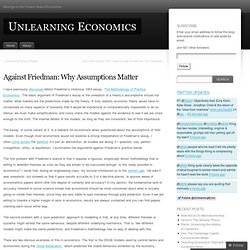
The basic argument of Friedman’s essay is the unrealism of a theory’s assumptions should not matter; what matters are the predictions made by the theory. A truly realistic economic theory would have to incorporate so many aspects of humanity that it would be impractical or computationally impossible to do so. Hence, we must make simplifications, and cross check the models against the evidence to see if we are close enough to the truth.
Paul Davidson: What Makes Economists So Sure of Themselves, Anyway? By Paul Davidson, America’s foremost post-Keynesian economist. Five Zombie Economic Ideas That Refuse to Die - By John Quiggin. The global financial crisis that began with the collapse of the U.S. subprime mortgage market in 2007 ended by revealing that most of the financial enterprises that had dominated the global economy for decades were speculative ventures that were, if not insolvent, at least not creditworthy.

Much the same can be said of many of the economic ideas that guided policymakers in the decades leading up to the crisis. Economists who based their analysis on these ideas contributed to the mistakes that caused the crisis, failed to predict it or even recognize it when it was happening, and had nothing useful to offer as a policy response. If one thing seemed certain, it was that the dominance of the financial sector, as well as of the ideas that gave it such a central role in the economy, was dead for good. Five of these zombie ideas seem worthy of particular attention and, if possible, final burial. There Is No Invisible Hand - Jonathan Schlefer.
By Jonathan Schlefer | 10:06 AM April 10, 2012 One of the best-kept secrets in economics is that there is no case for the invisible hand.

After more than a century trying to prove the opposite, economic theorists investigating the matter finally concluded in the 1970s that there is no reason to believe markets are led, as if by an invisible hand, to an optimal equilibrium — or any equilibrium at all. But the message never got through to their supposedly practical colleagues who so eagerly push advice about almost anything. Most never even heard what the theorists said, or else resolutely ignored it. Adam Smith's Lost Legacy: An Antidote to the Modern Economists Nonsense About Adam Smith's Use of the Metaphor of "An Invisible Hand" John Cook quotes George Gilder HERE .
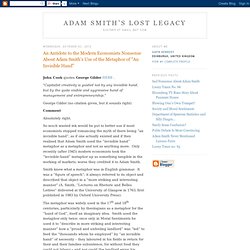
"Capitalist creativity is guided not by any invisible hand, but by the quite visible and aggressive hand of management and entrepreneurship. " George Gilder (no citation given, but it sounds right) Comment Absolutely right. So much wasted ink would be put to better use if most economists stopped romancing the myth of there being “an invisible hand”, as if one actually existed and if they realised that Adam Smith used the “invisible hand” metaphor as a metaphor and not as anything more.
Smith knew what a metaphor was in English grammar. The metaphor was widely used in the 17th and 18th centuries, particularly by theologians as a metaphor for the “hand of God”, itself an imaginary idea. Hence, George Gilder was right: “Capitalist creativity is guided not by any invisible hand, but by the quite visible and aggressive hand of management and entrepreneurship.” A final thought. Thank you George Gilder for your insight in this instance.
The Assumptions Economists Make - Jonathan Schlefer. Economists make confident assertions in op-ed columns and on cable news—so why are their explanations often at odds with equally confident assertions from other economists?
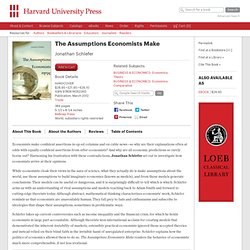
And why are all economic predictions so rarely borne out? Harnessing his frustration with these contradictions, Jonathan Schlefer set out to investigate how economists arrive at their opinions. While economists cloak their views in the aura of science, what they actually do is make assumptions about the world, use those assumptions to build imaginary economies (known as models), and from those models generate conclusions. Their models can be useful or dangerous, and it is surprisingly difficult to tell which is which. Schlefer arms us with an understanding of rival assumptions and models reaching back to Adam Smith and forward to cutting-edge theorists today.
Schlefer takes up current controversies such as income inequality and the financial crisis, for which he holds economists in large part accountable.